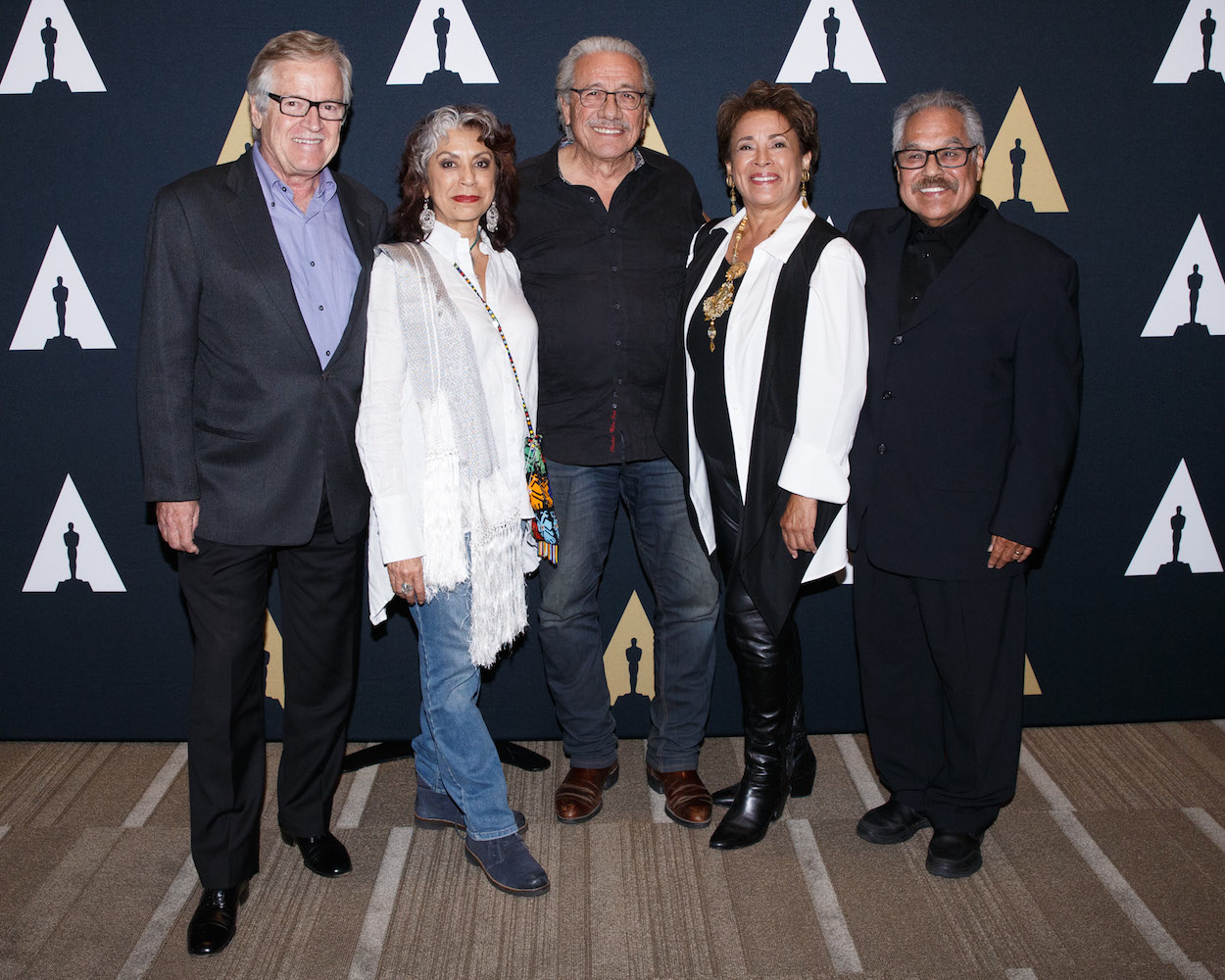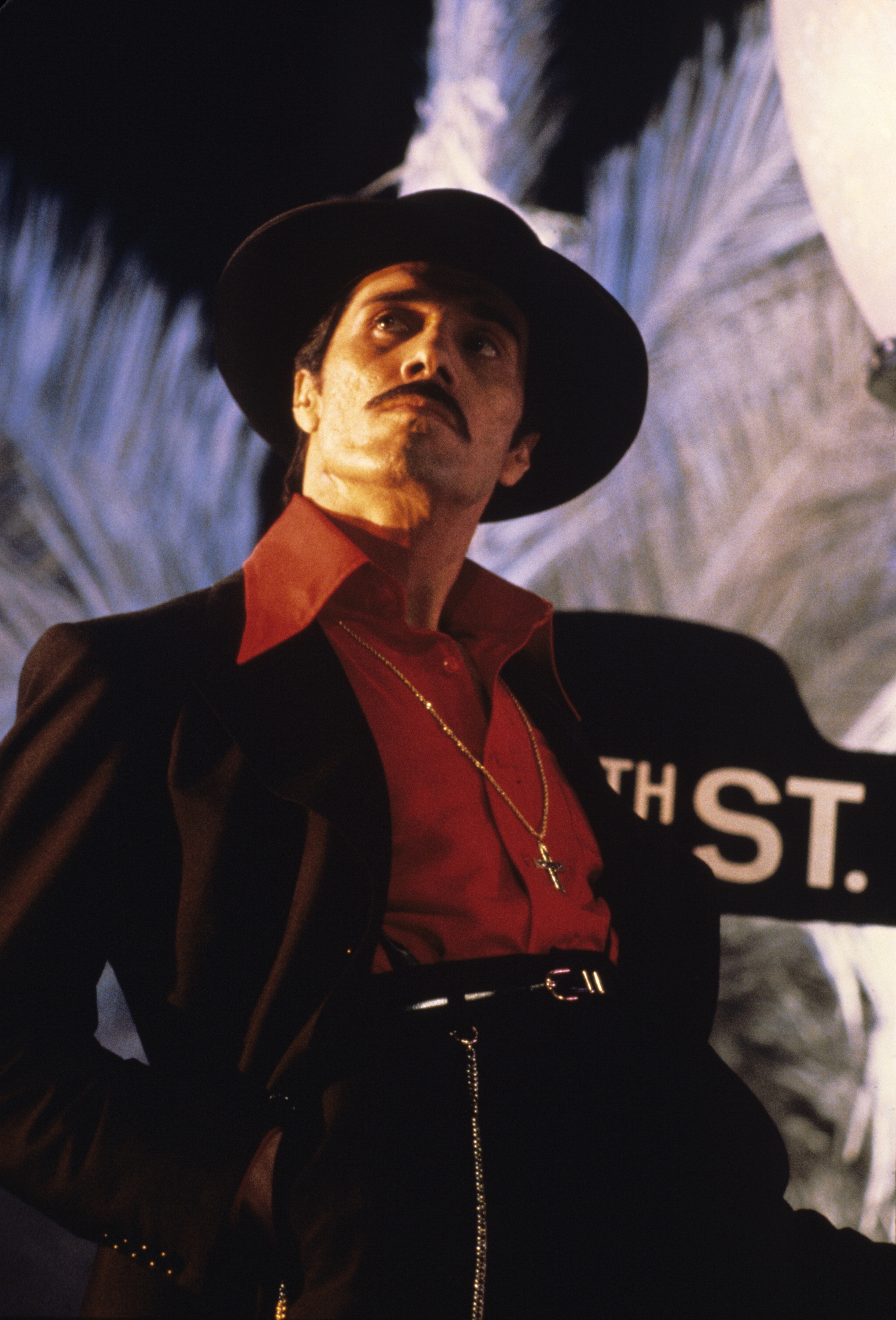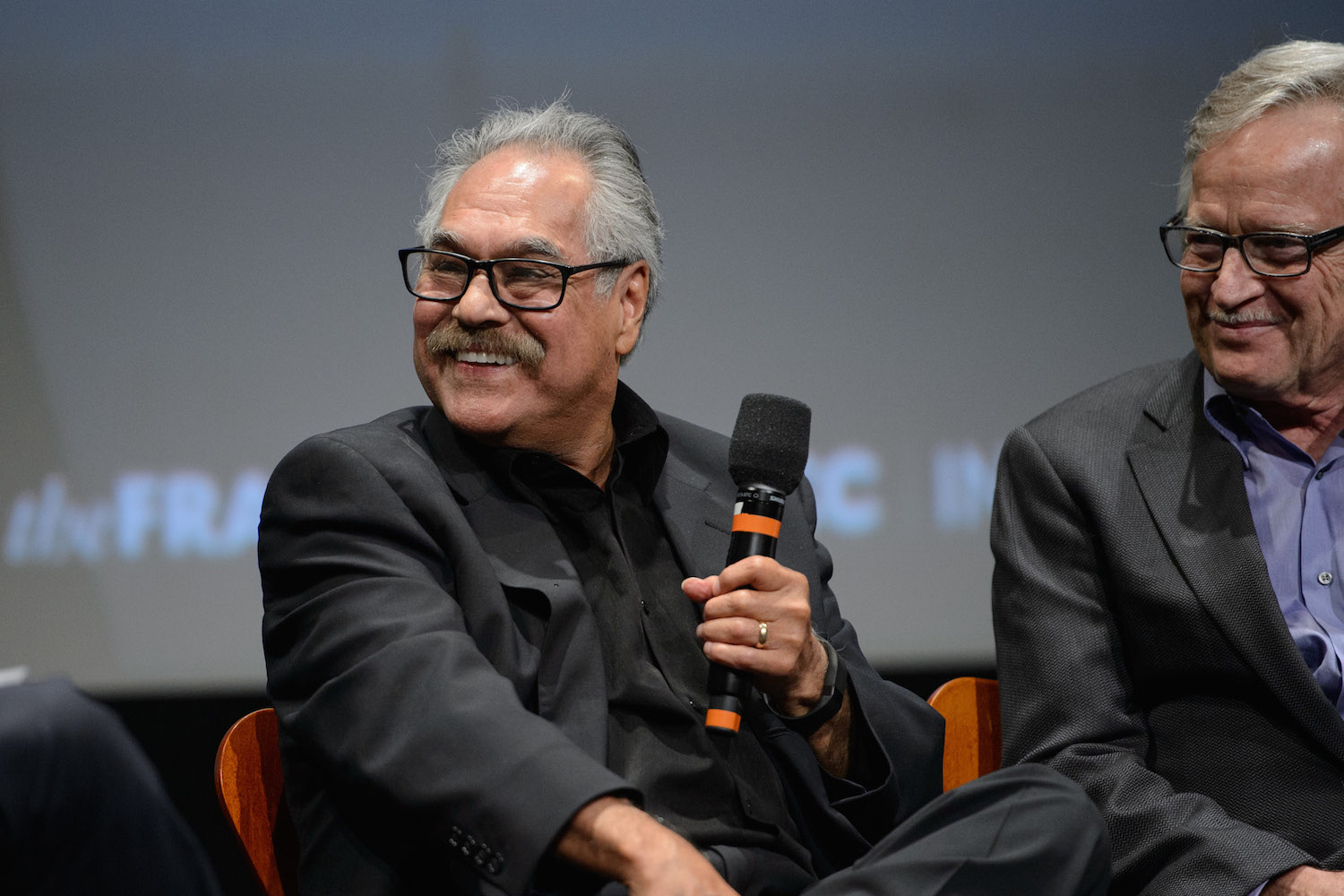Made for a tiny fraction of what other films of its kind cost at the time, Luis Valdez’s 1981 film adaptation of his acclaimed stage play, Zoot Suit, became a Chicano classic and introduced audiences to Edward James Olmos, who delivers one of his most memorable performances as the snarky Pachuco that drives the story. Back during its original release, the Academy didn’t show the film any love, completely ignoring it when it came to Oscar nominations. The film would go on to get a Golden Globe nomination for Best Motion Picture – Musical or Comedy. Statuettes or not, Valdez’s feature debut is an undeniably timeless piece of cinema history and the first major Latino production in the United States.
More than 30 years later, the Academy, through its From Latin America to Hollywood screening series, has rectified its dismissal even if only with a small gesture. Valdez, Olmos, actresses Alma Martínez and Rose Portillo, as well as producer Peter Burrell, were in attendance to reminisce about how subversive and exhilarating was to putting Latinos on screen at a time when opportunities were virtually nonexistent. The program also included a rare screening of Valdez’s very first short film, I Am Joaquin, based on the poem by Rodolfo “Corky” Gonzáles, and narrated by the director himself. The lyrical piece uses static photos to dive into the history of indigenous people, Mexicans, and Mexican-Americans, connecting them through their shared struggles.
These trailblazers had a lot to say about the original play, the film version, the recent revival, and why its ideas remain influential and rebellious today. Here are the highlights.
Luis Valdez on Edward James Being a Classic Hollywood Star
You can see it on the screen. He had the qualities of a young Toshiro Mifune, he had the qualities of Humphrey Bogart, and he had the qualities of the Pachuco. When you finally put it all together, these are the elements that you need to do it. No everyone can do the Pachuco. It was one of the most fortuitous events in the history of art all over the world, of the right person at the right time.
Luis Valdez on Helen Mirren Having a Pachuco Tattoo
Teatro Campesino was based in San Juan Buatista in 1971, we were still there, and in 1973 Peter Brooke came and brought his whole company from Paris. Distinguished actors from all over the worlds came, a group of about 30. They worked with us for that summer. Of the three months they were in the United States, two where in San Juan. We worked off the floor of our old warehouse. There was a 26-year-old blond, a very attractive blond, by the name of Helen Mirren. She tattooed her hands at the end of the summer. It’s the Pachuco symbol. She still has it. She covers it with makeup to play the Queen of England.
Edward James Olmos on Hearing Pachuco Slang in a Movie for the First Time
I parked my truck. I had furniture in it. I would move furniture all over the city, that’s how I stayed alive. There were 300 guys there, it was a cattle call, and Milt Commons gave me a piece of paper. Everybody was holding this little piece of paper, all of the guys, it was nothing but guys there, and they gave me this piece of paper, and I started to read it, and I said, “Oh my god. “ I was in shock, because I had heard this language when I was growing up on the streets, it was called Caló or Pachuco slang. It was the stuff that the kids on the streets who were really badass kids talked. It was a language that, everyone later found out, it was meant so that no one could understand it. Not the Spanish-speaking, not the English speaking, nobody. They would talk their own thing, and they had their own thing. I was just sitting there going, “Que le watchas a mis trapos Shit, what the heck does that mean?” W-A-T-C-H-A, it was written out, phonetically. It was beautiful. I had never seen it written, nor had I ever heard myself say it. I was like, “Watcha mi tacuche,” I had no idea what that was.

Alma Martínez on Latino Audiences Who Came to the Theater for the First Time
They warned us, the crowd is rowdy, so rather than having ushers, there were bouncers. I remember one night, it was really full, everyone is just with us, and I see walking up the aisle, this bouncer with a woman over his shoulder, carrying her out, and I was like, “Oh my goodness, this is not the theater that we’re used to.” But I think that’s the exciting part. We were doing theater for people who had never gone before. A lot of you have gone, you make reservations, you get a baby sitter, and you make reservations for dinner. No, everybody came. They would show up without reservations. They would come all the way to Hollywood. This is the thing with Latino audiences: we don’t just see a play once. “This was good! Let’s go and bring la tia, let’s bring the abuela!” They would come multiple times!
Luis Valdez on Why Zoot Suit Was His Trial By Fire
It was a baptism by fire that was aided by a lot of good friends. Peter Burrell, as the Line Producer and the hands-on guy, was absolutely instrumental in turning our very limited resources into what you see on the film. We used every frame. Jacqueline can tell you, we were in the bins, looking for a lost shot. We shot for 13 days, we were extended one day, 13 days, and that was it, it was my baptism of fire. “You can shoot your first film, if you want, but with no stars.” There weren’t any stars. Maybe Tyne Daly, maybe John Anderson, maybe Charles Aidman. The world did not know Edward James Olmos yet. He was a star after they saw him. He was a star on Broadway. He had been nominated for a Tony, but not on film. Bud Smith, the supervising Editor, he was on set also. I’m very grateful to the team that we put together, because it takes collaboration, and it takes ego-less collaboration to get something like this done. It was a labor of love for a lot of people.
Rose Portillo on How Zoot Suit Is Relevant Today
Having the privilege of being able to be part of the revival, it was palpable yet again, and the empowerment that it was giving to an audience, and the release that that audience felt, and the shame as well, that here we are again. And that is frightening, and also empowering, to be able to do theater, and give the gift of resistance and resilience that the play holds.

Luis Valdez on His Father’s Humble Connection to the Movies
My dad was in Cimarron, the first western that won at the Academy Awards. I wish my dad were here. He was just a mule driver. He and my maternal grandfather, drivers in the San Joachim Valley that were hired to drive mules. It was about the Oklahoma Land Rush, so they hired anyone who could handle a 16-mule team. So he was there, and he worked on it for a few days, and he always talked about the catering, he said, we ate really well. It’s a classic film, Richard Dix and some others, it’s an old western, but as a little kid, he used to tell me these stories, and I remember thinking, my dad made movies, I can make movies. It’s a legacy that’s passed on.
Luis Valdez on White Supremacy
This is an international, global city, so there’s an understanding on the street, there’s an understanding in the neighborhoods of what this movie is about, and what we’re really talking about. There’s a reactive minority that is feeling inferiority complex, an inferiority complex that I know. All the people talking about white power, or white supremacy when that’s not white supremacy, that’s a white inferiority complex, a vicious inferiority complex. I know that because I got well acquainted with inferiority complexes when I was growing up. You puff yourself up, you try to make yourself bigger than you are, and that’s what he’s doing. All of those people are so afraid of other people, and are like, “We need to defend White people. They’re crazy, because they’re overwhelmed, the world is a globe, and we’re all connected to each other, and this is why I think that Zoot Suit will speak to future generations for a little while longer.

Luis on His Dream to Work with Emilio “El Indio” Fernandez
When I started to cast La Bamba years later in 1985, I made a contact with an actor who was a favorite of mine, Emilio ‘El Indio’ Fernandez. Great director and great actor, also, the model for the Oscar, that’s his body. He loved the film, and he told me, ”La película tiene huevos, and that’s what I liked.” I dared to venture, “Would you be willing to do a small part in my next film?” He said, “Oh yes, absolutely, send me the script.” In between the time when I was able to send the script to him, he was in a motorcycle accident that ultimately killed him. He was on a motorcycle, and for a guy his age. I could no longer talk to him, I talked to his wife, and he was dying, but I communicated to him that I was still interested. I said, “Get out of bed and come to LA, and I’ll put you in the film.” He said, “I’ll be there.” He didn’t make it. He died. It’s just as well, because the part was played by Felipe Cantu, one of the founders of Teatro Campesino. The snake man, the man with the rattlesnakes, that was the role I was offering him. For me, it would have been the closing of a huge circle, because as a kid I used to see Mexican movies that he had directed and starred in, and had impacted my life, I was very proud as a Chicano that I was returning the favor to Mexico. And now we’re here at the Academy, and I know Emilio Fernandez is in heaven, laughing it up and having tortillas with everybody else!







